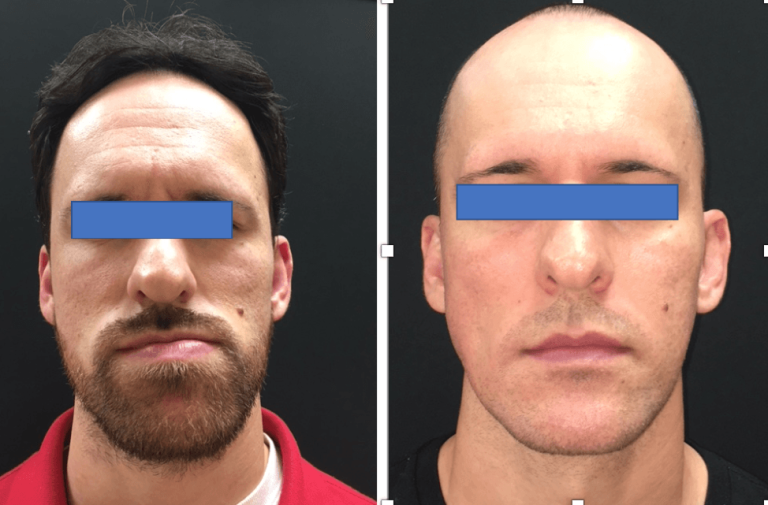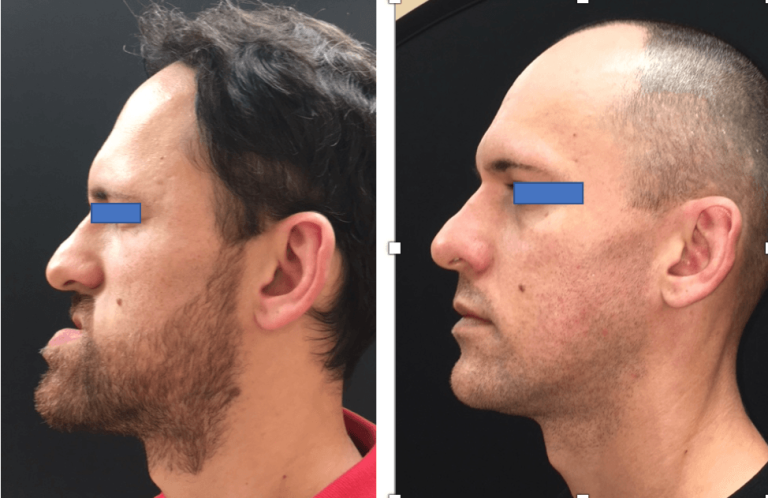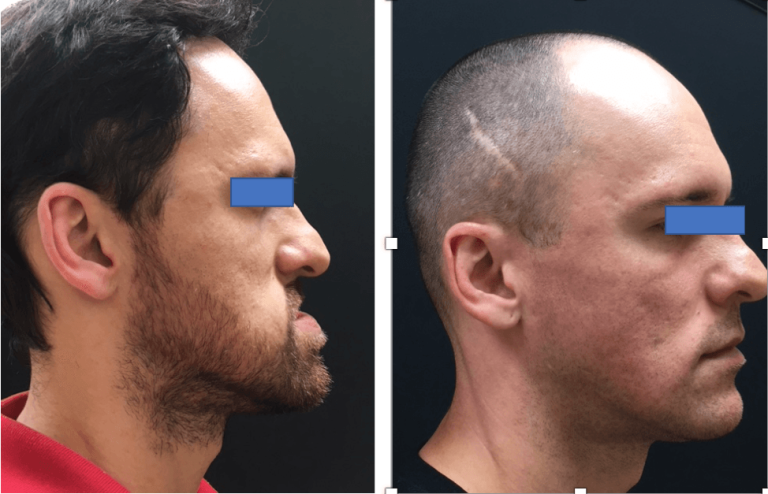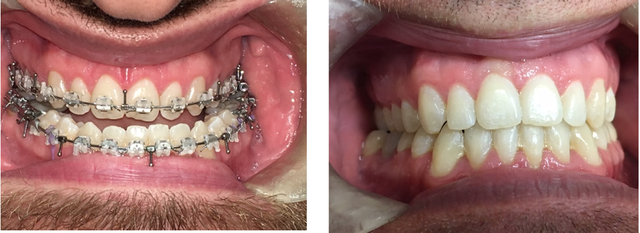Are you looking for experienced oral and maxillofacial surgeons near Chicago to address jaw misalignment and improve your smile? At North Shore Oral & Facial Surgery Center, our dedicated team, led by Dr. Walter Tatch, Dr. Yost Smith, and Dr. Salvatore Termini, utilizes the latest advancements in jaw surgery to create optimal outcomes for our patients.
Whether you experience difficulty chewing, facial asymmetry, or sleep apnea due to jaw problems, we offer personalized surgical solutions to restore both function and aesthetics. Contact us today at 847-623-5915 to schedule a consultation and explore how jaw surgery can enhance your confidence and overall well-being. At NSCOFS we utilize MIOS ( minimally invasive techniques) to help our patients recover quicker.

Orthognathic surgery, also known as corrective jaw surgery, is a specialized procedure designed to correct misalignment of the jaws. This misalignment can affect the upper jaw (maxilla), lower jaw (mandible), or both. The surgery aims to reposition the jaws into a more optimal position, improving both facial aesthetics and oral function.
What Can Orthognathic Surgery Correct?
Orthognathic surgery addresses jaw misalignment issues that can impact both function and appearance. Here are some common concerns it can address:
Malocclusion (Improper Bite): This includes issues like overbite (upper teeth significantly overlapping lower teeth), underbite (lower jaw protruding past upper jaw), open bite (inability to close the mouth completely when biting), and crossbite (upper and lower teeth misaligned).
Facial Asymmetry: Uneven jaw growth can lead to a noticeable imbalance in facial features. Surgery can help create a more symmetrical and balanced appearance.
TMJ (Temporomandibular Joint) Dysfunction: Jaw misalignment can contribute to TMJ pain, headaches, and difficulty chewing. Surgery can help improve joint function and reduce pain.
Sleep Apnea: In some cases, severe jaw misalignment can obstruct the airway during sleep, leading to sleep apnea. Surgery can open the airway and improve breathing.
Birth Defects: Certain birth defects, such as cleft lip and palate, can involve jaw malformations. Orthognathic surgery can be part of a comprehensive treatment plan to address these concerns..
The benefits of orthognathic surgery extend far beyond just cosmetic improvements. While creating a more balanced and aesthetically pleasing facial profile is a significant advantage, the true value lies in the functional improvements it offers. Here are some key benefits:
Improved Chewing Function: Proper jaw alignment allows for efficient chewing, which can benefit digestion and overall health.
-
Clearer Speech: Jaw misalignment can sometimes impact speech clarity. Surgery can help improve speech patterns and pronunciation.
-
Reduced Pain: Persistent jaw pain from TMJ dysfunction can be significantly reduced or eliminated with proper jaw alignment.
-
Enhanced Breathing: For cases where jaw misalignment contributes to sleep apnea, surgery can improve breathing and sleep quality.
-
Increased Confidence: Both the functional and aesthetic improvements achieved through orthognathic surgery can significantly boost self-confidence and overall well-being.
Candidacy for Orthognathic Surgery
Not everyone is a candidate for orthognathic surgery. Here are some factors considered when determining candidacy:
Severity of Jaw Misalignment: The extent of the jaw discrepancy plays a major role. If the misalignment is mild and doesn’t significantly impact function, surgery might not be necessary.
-
Overall Health: Underlying medical conditions, such as uncontrolled diabetes or autoimmune diseases, may need to be addressed before surgery.
Dental Health: Good oral health is crucial for successful surgery. Any gum disease or untreated cavities will need to be addressed beforehand.
Orthodontic Treatment: In most cases, orthodontic treatment with braces is required before surgery to properly align the teeth in preparation for the new jaw position.
-
Age: While orthognathic surgery can be performed on adults of all ages, it’s typically recommended after facial growth has been completed, usually in late teens or early adulthood.
The Corrective Jaw Surgery Procedure
Orthognathic surgery is a complex procedure performed by an oral and maxillofacial surgeon in a Chicago hospital setting under general anesthesia. The specifics of the surgery will vary depending on the individual case, but here’s a general overview of the steps involved:
Pre-Surgical Preparation: This may involve blood tests, imaging scans, and medication adjustments. We plan all our surgeries on a computer using Virtual Surgical Planning or VSP
Anesthesia: General anesthesia is used to keep you unconscious and pain-free throughout the surgery.
Surgical Access: The surgeon makes precise incisions in the gum tissue and bone to access the underlying jawbone.
Jaw Repositioning: The surgeon carefully repositions the jawbone segments into their new, optimal positions.
Fixation: Plates and screws are used to secure the repositioned jawbone segments in place.
Closing the Incision: The surgical incisions are then closed with sutures or dissolvable stitches.
Aftercare for Orthognathic Surgery
Following orthognathic surgery, a period of recovery with specific instructions from your provider is crucial. Here’s what to expect:
Hospital Stay: You may need to stay in the hospital for a few days following surgery, depending on your case. Most of the cases can be done in the outpatient settings at our Deerfield location.
Pain Management: Medication will be prescribed to manage pain effectively.
Diet: You will likely be on a liquid diet as your jaw heals. Gradually, you can progress to soft foods and eventually return to a regular diet.
Swelling and Bruising: Swelling and bruising around the face and jaw are common after surgery. These effects will subside gradually over time.
Physical Therapy: Specific exercises may be recommended to help with jaw mobility and healing.
Follow-up Appointments: Regular follow-up appointments with your surgeon are essential to monitor healing and ensure proper recovery.
Frequently Asked Questions
The procedure can take anywhere from one to four hours depending on the complexity. However, the entire process including pre-surgical orthodontics and post-surgical recovery can take up to two to three years.
Discomfort and pain are expected after surgery, but medication can help manage it. Your oral surgeon will provide specific instructions on pain management.
Orthognathic surgery is often covered by insurance if it is deemed medically necessary to correct functional problems like chewing or breathing difficulties. It’s always best to consult your insurance provider to understand your coverage.
There isn’t a one-size-fits-all answer, but some factors that might make someone a poor candidate include uncontrolled medical conditions, poor dental hygiene, or unrealistic expectations about the outcome.
Correct Jaw Imperfections and Improve Your Appearance
Regain a balanced smile and improved oral function with orthognathic surgery at North Shore Oral & Facial Surgery Center. Our board-certified oral and maxillofacial surgeons are committed to providing exceptional care and achieving optimal results. Don’t hesitate to take the first step towards a healthier, more confident you. Contact us today at 847-623-5915 to schedule a consultation and discuss your candidacy for jaw surgery. We welcome patients from Gurnee, Deerfield, and Libertyville, IL.





